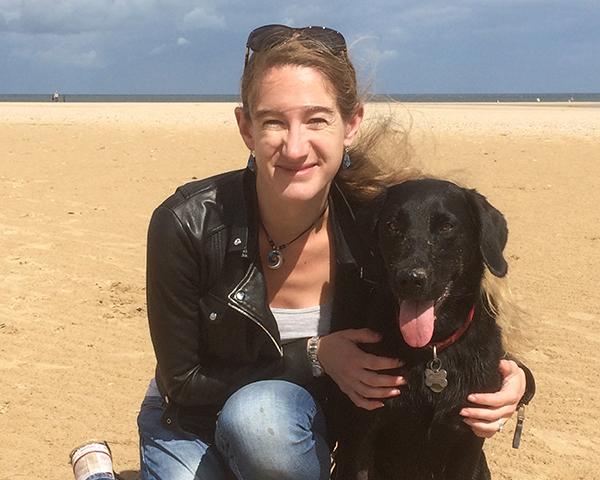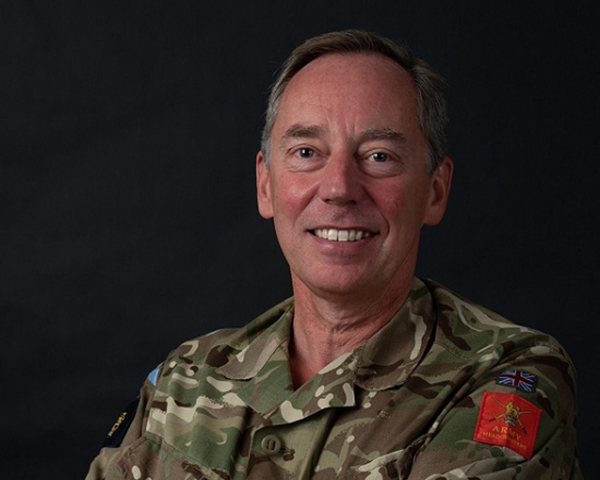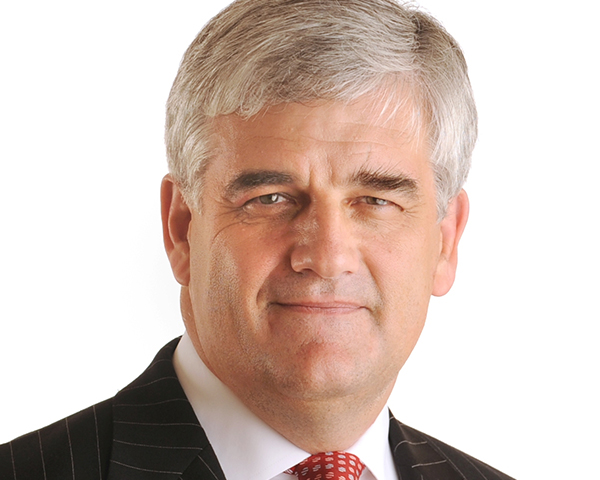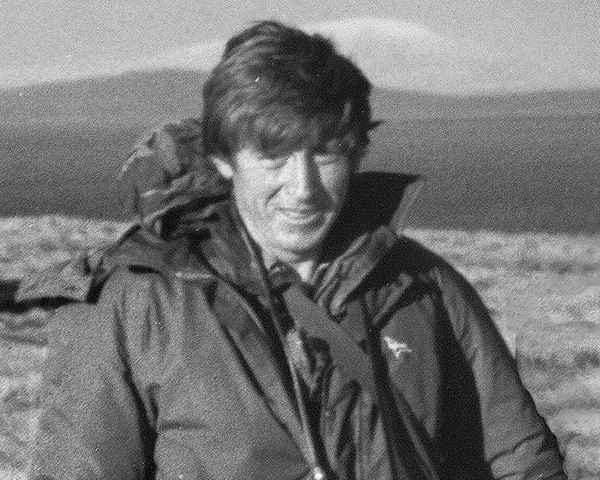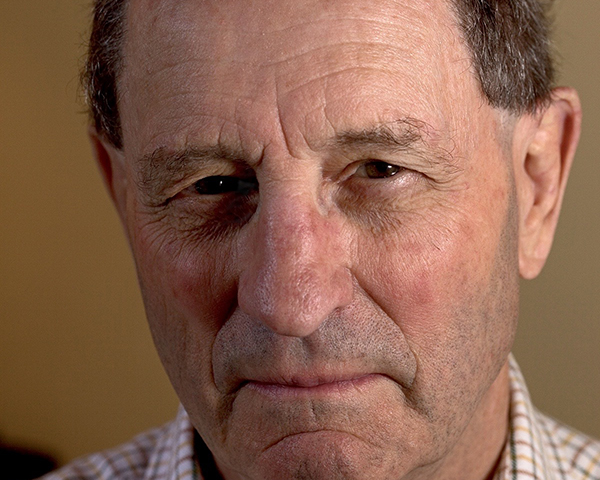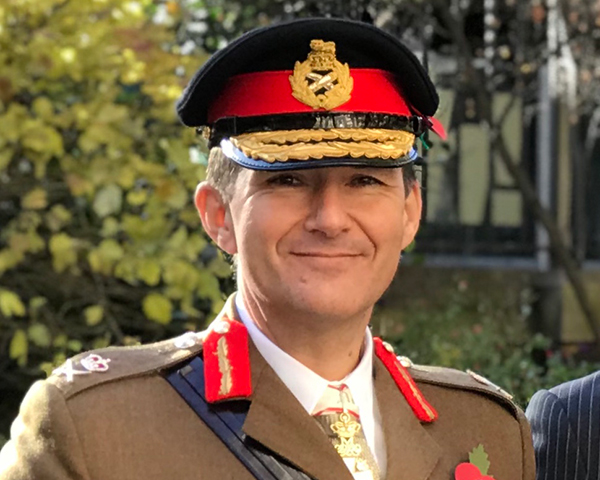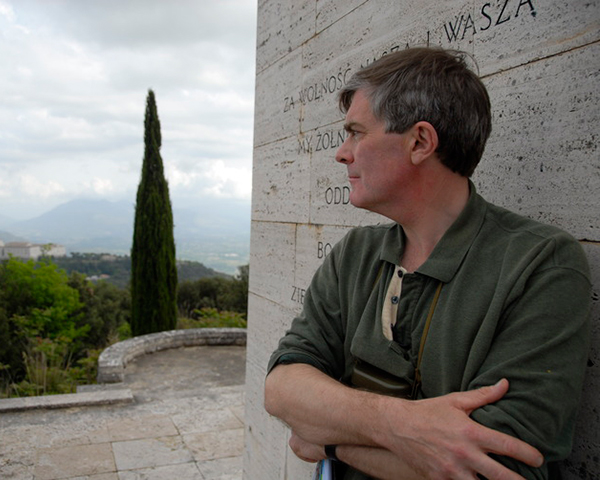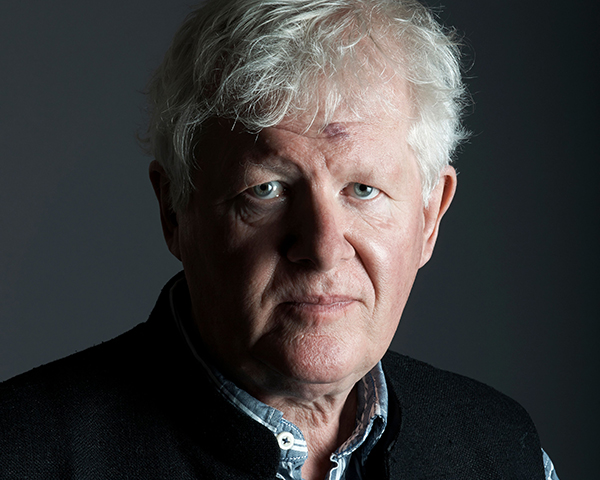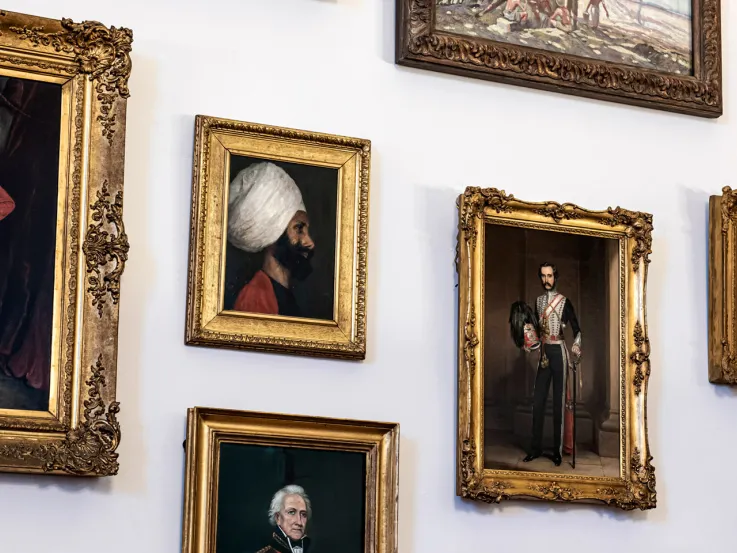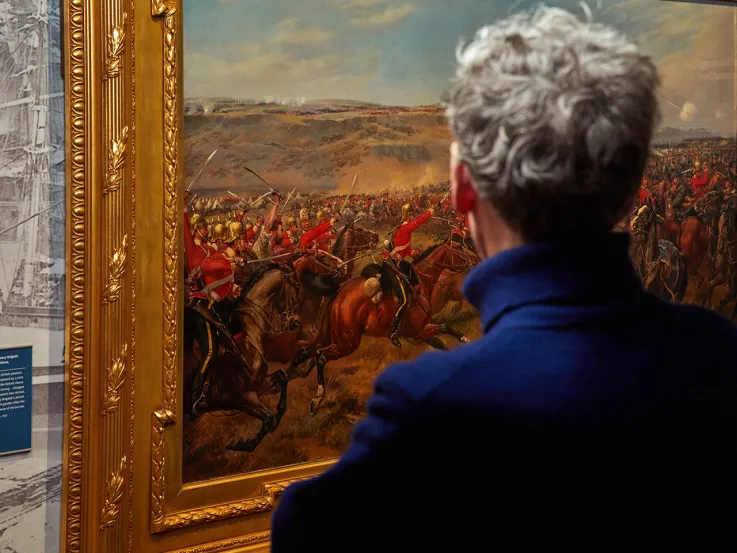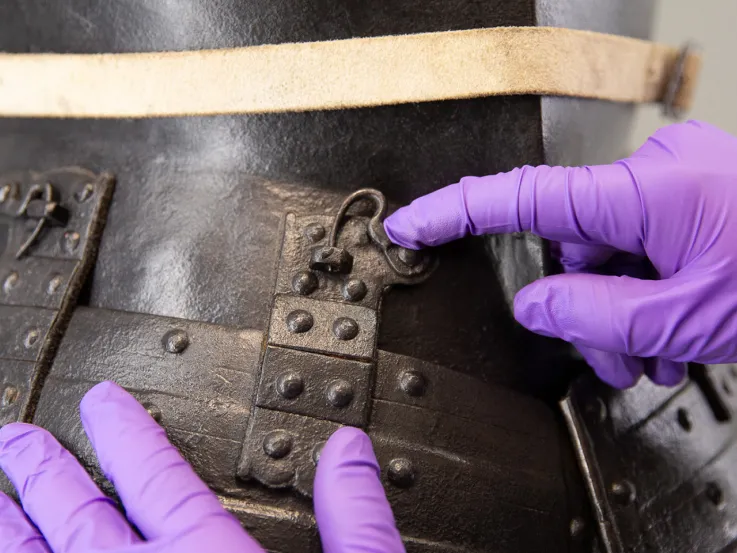Guest speakers
Index of speakers, 2020-21
Here are just some of the guest speakers taking part in our membership events programme, listed in chronological order:
- Major General Paul AE Nanson
- Dr Ismini Pells
- Professor Sir Hew Strachan
- Professor Ali M Ansari
- Lieutenant General Chris Tickell
- Rear Admiral Dr Chris Parry
- Colonel JH Crosland
- Lieutenant General Sir Cedric Delves
- Danny West
- Major General Julian Thompson
- Colonel Rex Cain
- Lieutenant General DM Chalmers
- Brigadier Brian Parritt
- Patrick Mercer
- Dr Glyn Prysor
- Rick Stroud
Major General Paul AE Nanson
Major General (Retired) Paul AE Nanson CB CBE was born in Ormskirk, Lancashire and educated at Merchant Taylors' School Crosby, Runshaw Tertiary College and Sandhurst.
Commissioning into the 3rd Battalion, The Royal Regiment of Fusiliers, his early service was spent at Regimental Duty as Platoon Commander, Adjutant and Company Commander with both the Fusiliers and 2nd Battalion, The Royal Anglian Regiment.
Following Staff College, he was Chief of Staff to 102 Logistics Brigade, based in Gutersloh, Germany, before returning to 1st Fusiliers and Command of Y Company. On promotion, he was posted to the Joint Services Command and Staff College (JSCSC) where he taught on the inaugural Intermediate Command and Staff Course (Land) and then to command of 1st Fusiliers based in Celle, Germany. He then was made Chief of Staff for 1st (UK) Armoured Division before taking command of 7th Armoured Brigade, 'The Desert Rats', in January 2011. Following brigade command, he spent 12 months serving with the US Marine Corps as Deputy Commander Regional Command (South West) in Helmand, Afghanistan. In April 2014, he returned to JSCSC as Director Army Division. He was promoted to major general in September 2015 and assumed the appointments of Commandant Sandhurst and Director Leadership. In April 2018, he became GOC of the newly formed Army Recruiting and Initial Training Command.
He has served on operations in Northern Ireland, Cyprus, Kuwait and Iraq (Op Granby), Bosnia, Iraq (Op Telic) and Afghanistan (Op Veritas and Herrick).
He retired from the Army in 2020 and has set up his own business consulting, coaching and speaking. He has also written a book, 'Stand Up Straight', which is a 'Sunday Times' and Amazon bestseller.
He is Patron to the Military Preparation College for Training and the charity Deptherapy; a trustee for Walking with the Wounded and the Desert Rats Association; and Leadership Ambassador for the Sir Stanley Matthews Foundation.
Married to Louise (Lu), he has two children, Milly and Henry. He enjoys hockey and running, especially with the family (when he can convince them that it is fun), hill walking in the Lake District, cooking and motor cycling – although he is no longer allowed to possess a motorbike!
Dr Ismini Pells
Dr Ismini Pells is a research associate at the University of Leicester and the project manager of 'Conflict, Welfare and Memory during and after the English Civil Wars, 1642 to 1710'.
Prior to this, she obtained her PhD from the University of Cambridge and worked as a research associate at the University of Exeter on the project 'The Medical World of Early Modern England, Wales and Ireland, c1500–1715'.
She is the author of 'Philip Skippon and the British Civil Wars: the "Christian Centurion"' (Routledge, 2020) and 'Reassessing Frontline Medical Practitioners of the British Civil Wars in the Context of the Seventeenth-century Medical World', Historical Journal, 62:2 (2019).
Dr Pells is also an academic advisor to the National Civil War Centre and the Cromwell Museum, a member of the National Army Museum's Research and Collections Advisory Panel, and a trustee of the Cromwell Association.
Professor Sir Hew Strachan
Professor Sir Hew Strachan, FBA, FRSE, Hon D Univ (Paisley) has been Wardlaw Professor of International Relations at the University of St Andrews since 2015. He is a Life Fellow of Corpus Christi College, Cambridge, where he taught from 1975 to 1992, before becoming Professor of Modern History at Glasgow University from 1992 to 2001.
He was Chichele Professor of the History of War at the University of Oxford and a Fellow of All Souls College 2002-15 (where he is now an Emeritus Fellow), and Director of the Oxford Programme on the Changing Character of War 2003-12. He was a Commonwealth War Graves Commissioner 2006-18 and a Trustee of the Imperial War Museum 2010-18, and a member of the national committees for the centenary of the First World War of the United Kingdom, Scotland and France.
In 2010, he chaired a task force on the implementation of the Armed Forces Covenant for the Prime Minister and has been a member of the Covenant Reference Group since its inception. In 2011, he was the inaugural Humanitas Visiting Professor in War Studies at the University of Cambridge and became a specialist adviser to the Joint Parliamentary Committee on the National Security Strategy.
He is an Ensign in the Queen's Bodyguard for Scotland (Royal Company of Archers), and in 2014 was appointed Lord Lieutenant of Tweeddale. In 2016, he was awarded the Pritzker Prize for Lifetime Achievement for Military Writing. His recent publications include 'The Politics of the British Army' (1997); 'The First World War: To Arms' (2001); 'The First World War: a New Illustrated History' (2003); and 'The Direction of War' (2013).
Professor Ali M Ansari
Professor Ali M Ansari, BA (Lon) PhD (Lon), FRSE is professor of Iranian History and Founding Director of the Institute for Iranian Studies at the University of St Andrews; Senior Associate Fellow, Royal United Services Institute.
In 2016, he was elected a Fellow of the Royal Society of Edinburgh. In 2018, he was elected Hon Vice President of the British Institute for Persian Studies.
His publications include: 'Modern Iran since 1797', 3rd updated Edition, Taylor and Francis, London, 2019; 'Iran, Islam & Democracy: The Politics of Managing Change' 3rd updated Edition, Gingko, London, 2019; 'Iran: A Very Short Introduction', OUP, 2014; 'The Politics of Nationalism in Modern Iran', CUP, 2012; 'Iran Under Ahmadinejad', Adelphi Paper, IISS, January 2008; 'Confronting Iran: The Failure of US Policy and the Roots of Mistrust', Hurst, London, 2006. He is also Editor of the Cambridge History of Iran Vol 8 (The Islamic Republic).
Lieutenant General Chris Tickell
Lieutenant General Chris Tickell CBE was commissioned into the Royal Engineers in 1983 and spent six years as a troop commander in Germany, Northern Ireland, UK, Botswana and Norway.
After Staff College and a tour in the Ministry of Defence (MOD), he took command of 9 Parachute Squadron RE. This included tours in Bosnia and Kosovo.
As a lieutenant colonel, he worked in the Operations Branch of the Army HQ, before taking command of 23 Engineer Regiment (Air Assault) as it deployed to Kuwait/Iraq for the Second Civil War in January 2003. On promotion in 2005, he moved to the Directorate of Training. He then attended the Higher Command and Staff Course.
He was promoted to brigadier in 2007 and commanded 8 Force Engineer Brigade for two years; he deployed with his Headquarters to Afghanistan for the final six months. After two years running the Army Staff Course, he returned to the MOD working for the Chief of Defence Personnel for nine months. He was promoted in 2013 and commanded the Army Recruiting and Training Division until October 2016. He was the Army’s Director of Capability from then until Summer 2019. He was promoted to lieutenant general and became Deputy Chief of the General Staff in August 2019.
He was appointed MBE in 2000, OBE in 2003 and CBE in 2010. He is married and has 2 teenage daughters.
Rear Admiral Dr Chris Parry
Rear Admiral Dr Chris Parry CBE PhD read Modern History at Jesus College, Oxford, after which he spent 36 enjoyable, rewarding years in the Royal Navy as an aviator and warfare officer.
He commanded the destroyer HMS Gloucester, the Amphibious Assault Ship HMS Fearless, the UK's Amphibious Task Group and the Maritime Warfare Centre.
He also held five senior Joint and UK Ministry of Defence appointments, with responsibility for the strategic development, policy, effectiveness and operational deployment of all three armed forces out to 2030.
As well as sailing every sea, he experienced regular operational tours and combat operations in Northern Ireland, the Gulf and the Falklands, where he rescued 16 SAS troopers from a glacier during a hurricane in South Georgia and disabled the Argentinian submarine Santa Fe. He was awarded the Guild of Air Pilots and Air Navigators Helicopter Rescue Award in 1983 and his Falklands War diary was published as the bestselling 'Down South' in 2012.
Nowadays, he runs his own strategic forecasting and trouble-shooting company, advising governments, leading commercial companies and banks about geo-political and strategic issues, future trends and systemic risk. The founding Chair of the UK's Marine Management Organisation, he is an internationally recognised authority on marine and maritime issues, as well as countering terrorism, criminality and unconventional conflict.
A regular broadcaster and commentator in national and international media, he is an active author, most recently with the influential 'Super Highway: Sea Power in the 21st Century', which in 2017-18 was on the US Secretary of Defence's Recommended Reading List. The winner of the Maritime Foundation's Best Journalism Award in 2016, he has a PhD in Psychology and History.
Colonel JH Crosland
Colonel JH Crosland CBE MC started his career in 1965 as a private soldier in The Parachute Regiment. Out of 100 men who started training, only seven passed. He was promoted to lance corporal before going to the Royal Military Academy Sandhurst. In 1967, he was commissioned into Para, serving in Northern Ireland (1969) before passing Selection for the SAS in 1972. He has served in both regiments all over the world. During 1972-76, he served in the Dhofar/Oman conflict where much battlefield experience was gained.
1976-78 saw him in BRIXMIS (British Commander in Chief's Mission to the Soviet Forces in Germany) working in the former East Germany reporting on the Group of Soviet Forces. In 1980, he helped remove some squatters from the Iranian Embassy, which was one way of celebrating his youngest daughter's first birthday.
Overall, his specialty was operations, intelligence gathering, training and SAS selection. All this stood him in good stead during the Falklands campaign, when he was gazetted with the Military Cross for the battles at Goose Green/Darwin, Wireless Ridge and leading the helicopter assault onto Swan Inlet Farm. Later, after commanding Training Squadron at Hereford, he took command of 21 SAS, which then had an operational role in support of 1 BR Corps as forward reconnaissance.
Next, he embarked on an international path, as the Intelligence Officer to AMF (L) (Ace Mobile Force (Land)), followed by commanding officer of the ILRRPS (International Long Range Reconnaissance Patrol School) in Southern Germany. He was then appointed Defence Attaché in Belgrade, FRY (Federal Republic of Yugoslavia) in August 1996. A diplomatic posting was a completely new role. Three years later, after monitoring the situation in Kosovo on a daily basis, he left Belgrade the night before Nato bombed. He returned to the Ministry of Defence (MOD) as an adviser before going back out to Macedonia to help lead KFOR into Kosovo. He was awarded the CBE in 1999.
His last appointment as Chief Special Operations encompassed all his previous skills when attempting to gain consensus from 19 nations as well as supporting 10 Staff branches at SHAPE (Supreme Headquarters Allied Powers Europe). He was responsible for the Special Forces (SF) operations in support of KFOR. He helped to re-establish our Embassy in Belgrade after the Nato bombing.
On retirement in 2001, he joined UTM Ltd (Ultimate Training Munitions) for three years. UTM provided an innovative training system.
He was appointed Honorary Colonel of 21 SAS (Artists) (V) from 2001 to 2016. He was the Executive Vice President of the SAS Association from 2008 to 2014 and is an Elder of The Parachute Regiment. He is President of the ARA (Artist Rifles Association) and a Freeman of the City of London. He was a Governor of Seaford College, Sussex from 2002 to 2016, and is now a Parish Councillor.
Lieutenant General Sir Cedric Delves
Lieutenant General Sir Cedric Delves KBE DSO was commissioned into The Devonshire and Dorset Regiment in 1968 from the Royal Military Academy Sandhurst.
His 39-year service was spent mostly in command appointments, involving numerous operational tours, some with the Special Air Service.
He rose to command the Field Army before taking up a Nato appointment in the Netherlands, where he promptly lost a leg to a drunk driver. Following early medical discharge, he went on to chair Blesma, the charity for limbless service veterans.
He gardens a bit, takes photographs and visits the Falklands where he soldiered for a brief period in 1982.
Danny West
Danny West served for 32 years in the Army, 30 of them in the Special Air Service Regiment.
His military career started in 1963, with the Royal Signals; on attachment to the 10th Royal Hussars he first saw active service in Aden. Passing SAS Selection in 1965 he joined the Air Troop of D Squadron 22 SAS to see more active service in numerous places, including Borneo, Aden again, and Dhofar where he became fluent in Arabic.
He was commissioned in 1982, almost immediately taking up the post of Second-in-Command of D Squadron, to take a full part in the Falklands Conflict. Other key Special Forces appointments were to follow, on the Staff and at Regimental Duties, these drawing on his extensive experience and broad knowledge of special operations.
On retirement he remained fully active to continue providing professional, security assistance and advice to friendly and allied nations, mainly across the Middle East and its immediately neighbouring regions.
He now lives in happy retirement with his wife and two teenage children.
Major General Julian Thompson
Major General Julian Thompson CB OBE joined the Royal Marines a month after his 18th birthday and served mainly in Royal Marine Commandos for 34 years in the Near, Middle, and Far East, and in the Southern and Northern Regions of Europe. He has commanded on operations at every level from platoon to brigade. He commanded 40 Commando Royal Marines for two and a half years, and the 3rd Commando Brigade for two years.
The latter period of command included the Falklands War of 1982, in which his brigade carried out the initial landings and fought the majority of the land battles. His responsibilities in his last appointment in the armed services involved commanding and training the Special Forces tasked with providing the United Kingdom's response to maritime terrorism.
His staff appointments included Chief of Staff of the 3rd Commando Brigade, Chief of Staff Commando Forces, and Assistant Secretary to the UK Chiefs of Staff Committee. He is a graduate of the British Army Staff College and later instructed there. He is a graduate of the Royal College of Defence Studies.
He retired as a major general at the end of 1986, and spent three years at the Department of War Studies King's College London researching Logistics and Armed Conflict. As a result of this research, he published 'The Lifeblood of War: Logistics in Armed Conflict' (Brassey's 1991). He is now a Visiting Professor at the Department of War Studies King's College London.
For eleven years after leaving the Royal Marines, he was a consultant with the City of London Insurance Brokers Alexander & Alexander (later Aon) advising on Crisis Management and Terrorism. For several years, he was a consultant with Exploration Logistics Group PLC, which supported operations in remote environments, including de-mining.
He broadcasts and writes on defence matters and military historical subjects. He has had 20 books published, contributed to another eight, and edited one.
For three years, he was retained by 'The Observer' to write pieces on defence issues. During the Gulf War of 1991, he contributed a column every Sunday in the paper, and was employed by 'The Observer' as their adviser on military matters. During Op Telic, he wrote for 'The Observer' again, and for 'The Plymouth Evening Herald'.
In 1994-95, he co-scripted some 23 short documentaries for the BBC to mark some key Second World War 50th anniversaries, and presented the majority of them. Nine of these formed part of the BBC's TV coverage of the VE and VJ Day commemorations, for which the BBC received a BAFTA. More recent TV work includes participation in the BBC live programme in June 2004 to commemorate the 60th anniversary of the Normandy Landings, a documentary about a British plot in 1944 to kill Hitler, a documentary about the 1962 Limbang Raid in North Borneo screened by the History Channel in December 2005, and a two-part TV programme for the History Channel on the 1916 Battles of the Somme and Verdun, screened in July 2006.
Colonel Rex Cain
Colonel Rex Cain OBE was born in Middlesex in 1928 and was educated at the John Bright School and King's College London. In 1949, he joined the Army as a university entrant, and in 1950 was commissioned in the Middlesex Regiment (Duke of Cambridge's Own).
He served in Hong Kong, Korea, Austria and Cyprus (Mentioned in Despatches). He took voluntary retirement in 1965 to become an administrative officer in the Court Department of the University of London.
Following service in the Territorial Army, he was Cadet Commandant for Middlesex and North West London from !979 to 1983. He was appointed OBE in 1983 and a Deputy Lieutenant of Greater London in 1985.
He was President of the Middlesex Regimental Association from 2008 until its closure in 2016.
Lieutenant General DM Chalmers
Lieutenant General DM Chalmers DSO OBE was educated at Bearwood College and more recently Trinity Hall, Cambridge, where he read International Relations.
His military service commenced in 1984 with 18 months in the ranks before he was commissioned into the 1st Battalion of the Royal Irish Rangers. He served with them in Germany, England, Northern Ireland, Cyprus, and Scotland.
In addition to Regimental command and staff appointments, he served tours with UNTAC in Cambodia and both UNPROFOR and IFOR in Bosnia.
Following graduation from the US Army Command and General Staff College and the US School of Advanced Military Studies he was appointed to a plans appointment in HQ 1st (UK) Armoured Division, a role which included deployments to Oman, on Ex Saif Sareea II, and Iraq on Op Telic. On promotion to Lieutenant Colonel he became the Military Assistant to the Chief of Joint Operations before assuming command of the 2nd Battalion of the Princess of Wales’s Royal Regiment in 2007, serving principally in Afghanistan.
Promoted to Colonel in 2009 he became Chief of Staff 3rd (UK) Division prior to assuming command of 12th Mechanised Brigade during which time he returned to Afghanistan as Commander Task Force Helmand. He subsequently served in Washington as CDS’s Liaison Officer to the Chairman of the US Joint Staff before taking up the J3 portfolio at the UK Permanent Joint Headquarters.
On promotion to Major General he was seconded to the US Army and immediately deployed to Operation Inherent Resolve from September 2015 to August 2016 as the Combined Joint Task Force Deputy Commander for Strategy and Support. Upon return from the Middle East he assumed the role of Deputy Commanding General - Support, for the III (US) Armored Corps. He took up the appointment of Deputy Chief of Defence Staff (Military Strategy and Operations) on promotion in June 2018.
He is married to Helen, struggles to maintain a private pilot’s licence and tries to hang onto his youth by rowing. Both he and Helen are also enthusiastic but ineffective fly fishermen.
Brigadier Brian Parritt
Brigadier (Retired) Brian Parritt CBE served 36 years in the British Army, culminating in five years as Director of the Intelligence Corps. Throughout his service, he held a variety of senior intelligence and security appointments all over the world, including Hong Kong, Singapore, Malaysia, Malta, Libya and Cyprus. He is a parachutist and was wounded and commended for bravery as a gunner officer during the Korean War. He was awarded the MBE during the ENOSIS Campaign in Cyprus, and the CBE in Northern Ireland.
A graduate of Hong Kong University in Chinese (Mandarin) and the Staff College, Camberley, he is a Freeman of the City of London and from 1981 to 1985 was an aide de camp to Her Majesty Queen Elizabeth II. In 1986, he was appointed Honorary Colonel of the Intelligence Corps Volunteers and in 2001 was appointed to be the first Deputy Colonel Commandant of the Intelligence Corps. He was Chairman of the Intelligence Corps Museum Board of Trustees for 20 years and still remains a Trustee. In 2008, he was presented with the 'Annual Award for Distinguished Service to the Intelligence Corps'.
After leaving the Army, he set up his own company specialising in cruise ship security and eventually provided employment to over 200 ex-servicemen. He was privileged to be elected as a Companion of the Nautical Society (CNI), an unusual honour for a soldier, and on their behalf published four books, 'Security at Sea', 'Illegal Drugs at Sea', 'Stowaways at Sea' and 'Crime at Sea'. After selling his company to an American security company, he was employed by the International Maritime Organisation of the United Nations to write and then conduct a series of maritime security seminars all over the world. In 2006, he was awarded the Annual Maritime Security Recognition Award by the US Maritime Security Council.
In 2010, he published a book in four volumes entitled 'A Dangerous Game', which detailed the 23 campaigns which qualified for a clasp on the India General Service Medal 1854-95. He has also published 'The Intelligencers: The Story of British Military Intelligence', and 'Chinese Hordes and Human Waves: A Personal Perspective of the Korean War 1950-53'. In 2014, he won a prize of 2 million Won given by the Korean government for an essay of 50,000 words entitled 'Living through the War'.
In 2017-18, he was employed in the Cabinet Office to be an Independent Advisor in a Review initiated by the government to examine the problems of 'Retrospective Medallic Recognition'. The result of this Review was that over 45,000 servicemen received well deserved recognition, including veterans of the Arctic Convoys, Bomber Command, the Berlin Airlift, Cyprus and the Falklands War.
In 2018, he was invited to Korea where, at a major ceremony, he was presented with the Order of Moran by the prime minister, the first UK citizen to have received this Honour.
Patrick Mercer
Patrick Mercer OBE, by his own confession, has an obsession with military history.
Having read Modern History at Oxford, he served in the Army for 25 years, mostly in Northern Ireland, Uganda and Bosnia, before leaving to become the defence correspondent for BBC Radio 4's Today Programme and then an MP.
But, in 2014, he returned to his first love - military history.
Widely travelled over many of the British Army's most dramatic battlefields, he is credited with being the first Briton to return to the Crimean battlefields in 1993. Since then, he has shared his experience and enthusiasm with many people in any number of extraordinary places!
Mercer specialises in the Seven Years' and Napoleonic Wars, colonial warfare, the Crimean Campaign, the Indian Mutiny, Irish rebellions and the Italian Campaign of 1943-45. He has written extensively on the Crimea and the 1798 Irish Rebellion, had a trilogy of historical novels published, as well as a litany of magazine articles. With lively views on current affairs, he also writes a regular column for 'The Yorkshire Post'.
Dr Glyn Prysor
Dr Glyn Prysor is a writer and historian specialising in the history of the world wars. Formerly the Chief Historian at the Commonwealth War Graves Commission, he has led battlefield tours across Europe.
Glyn advised the UK government on the commemoration of the First and Second World Wars, and contributed to national and international media coverage of major anniversary events between 2014 and 2019. Among his published works is 'Citizen Sailors: The Royal Navy in the Second World War' (Penguin).
Rick Stroud
Rick Stroud is a producer, director and writer. His latest book is 'Lonely Courage' about the women agents dropped into France in the Second World War.
As well as 'Lonely Courage', he has written six books including: 'The Book of the Moon', a study of the all things lunar from moonrock to magic; 'Rifleman: A Front-line Life' with Vic Gregg, a Rifleman's view of the Second World War'; 'The Phantom Army of Alamein', how artists fooled Rommel and pulled off the biggest conjuring trick in the Second World War'; and 'Kidnap in Crete', the story of the kidnap of a German general by the SOE and Cretan guerrillas led by Patrick Leigh Fermor. He is trustee of the London Library.

